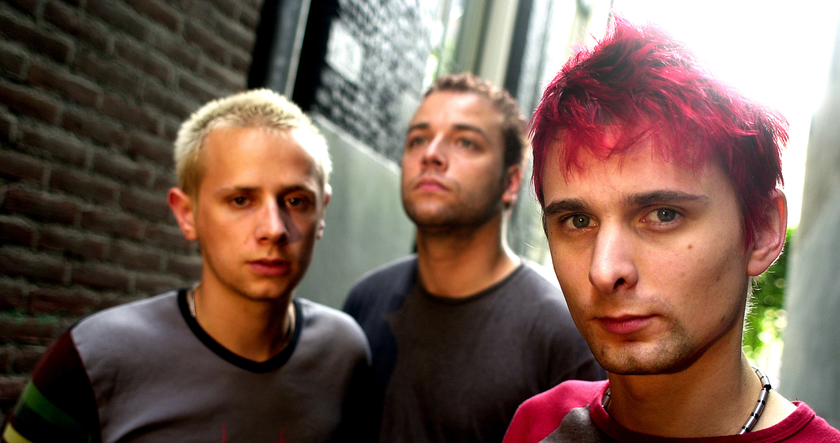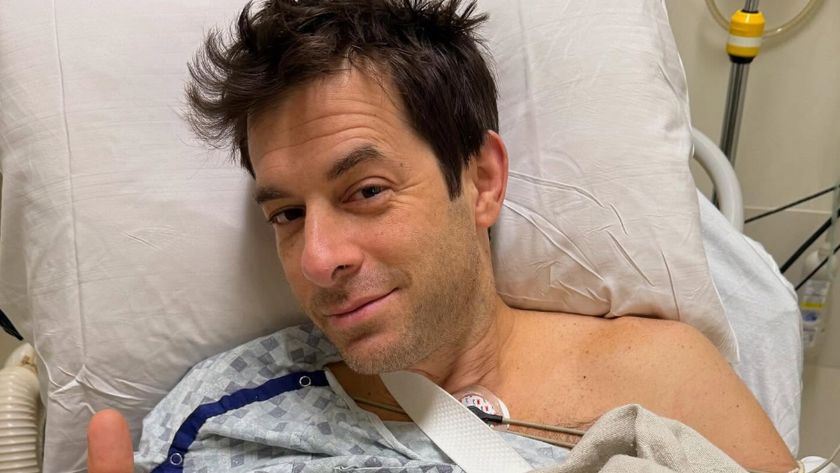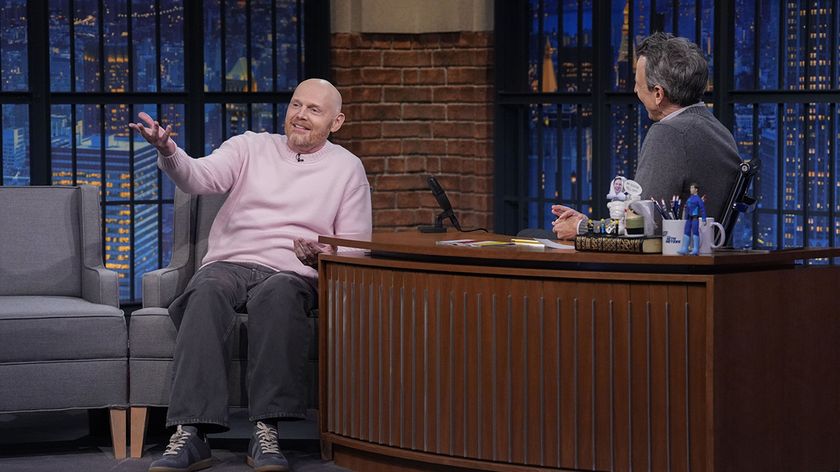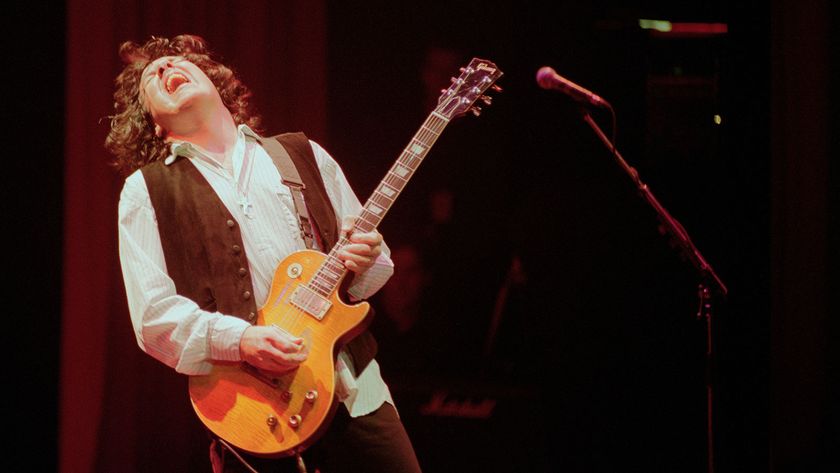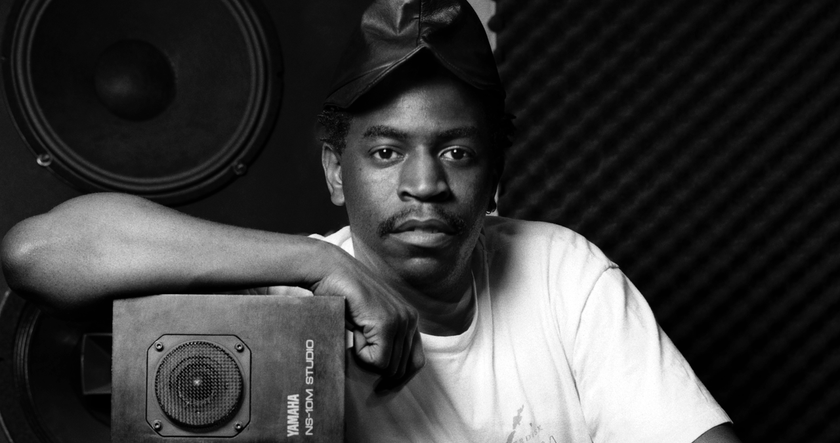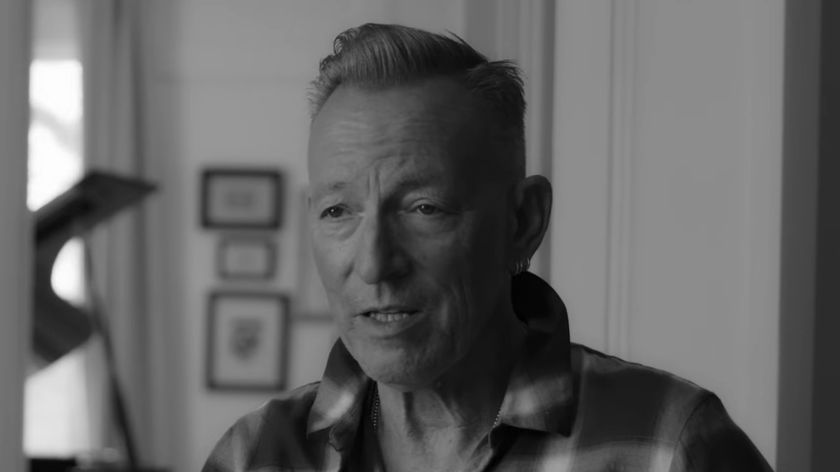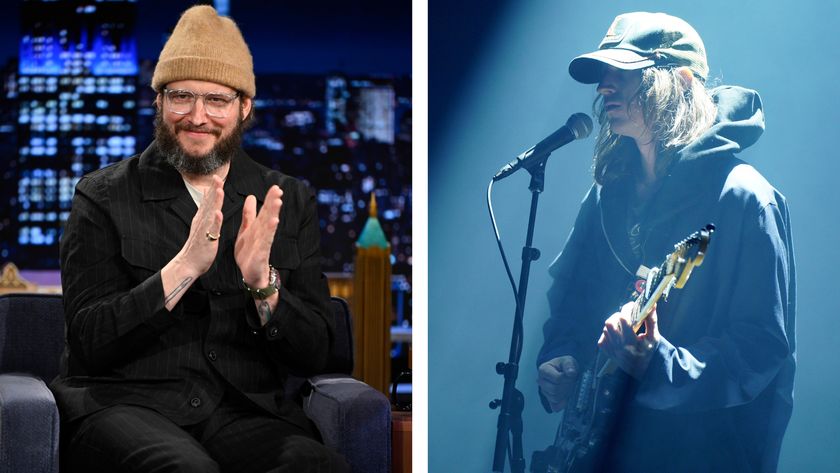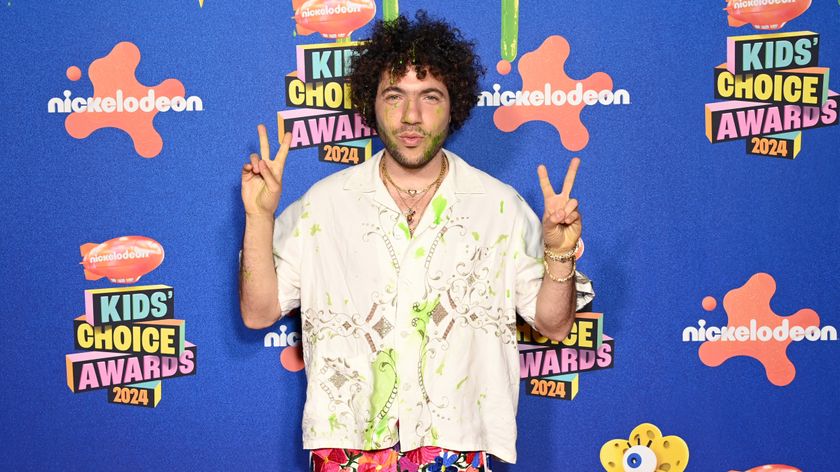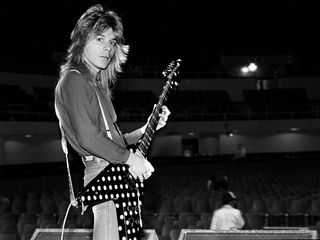
Exclusive book excerpt: Randy Rhoads by Steven Rosen and Andrew Klein
The recently published coffee table book Randy Rhoads, written by Steven Rosen and Andrew Klein (Velocity Publishing Group, is a fascinating look at the life of the late guitar star, who died in a tragic plane crash 30 years ago on 19 March 1982.
The following excerpt is from Chapter 9 of Randy Rhoads, along with an interview with co-author Rosen.
On June 27th, 1981, the tour pulled into the guitarist’s own backyard. The Long Beach Arena was the 39th date on the tour. Almost 10 years earlier to the day, on July 11th, 1971, Randy watched Alice Cooper perform there, his first concert and a turning point in his life. It couldn’t get any more perfect if you were writing the script. For Randy, this must have felt like he had climbed the highest mountain. Returning to his hometown as a conquering hero, a vanquisher of everything that stood before him. This must have been the true realization of his dream. All of his friends were there, and they finally got to see who he became.
“By the time we played the Long Beach Arena, Randy was already enjoying his success,” Rudy Sarzo explained. “Because he was a part of the process from the very beginning. We didn’t come back home thinking that we were rock stars, because we knew we were just players in Ozzy’s band. But Randy was getting a completely different level of attention than Tommy and me. He recorded and composed the songs on those great records, so it was fitting that he would draw more attention.”
Randy sent a limousine for his family. The guitarist rode with them, and for the 60-minute drive South from Burbank to Long Beach on the 405 Freeway, everybody would have been animated and excited. This was the first time any of them would see Randy play with Ozzy, and whatever they expected, their imaginations would fall far short of reality. Sitting in the corner of the expansive slick black interior, a seasoned pro by this time and accustomed to the lush splendor of the stretch, Randy’s smile would have lit up the darkened limo.
They arrived early for soundcheck where Randy noodled with his pedalboard to eliminate any stubborn ghosts or gremlins. Save for the crew and Long Beach Arena staff, the house was empty. Kelle remembered sitting out amongst the empty seats while his brother ran through the settings. It must have sounded like the very voice of God coming down from the ceiling, the mute of Randy’s strings shaking the rafters, and the thunder of his power chords vibrating the arena’s foundation.
If Randy turned it up a notch for the hometown crowd, no one would be surprised. When the lights dimmed and his family saw him first take the stage, they may have experienced a strange sensation of, “This is my son; this is my brother. I know him, but I don’t know that person up there.” They saw the spectacle of raised lighters, and experienced the adrenaline-fueled moment before the first note was struck. Randy knew his family was out in the crowd somewhere and he would have reached a little deeper inside himself, ripping through the deadliest arsenal of guitar riffs anyone had ever heard.
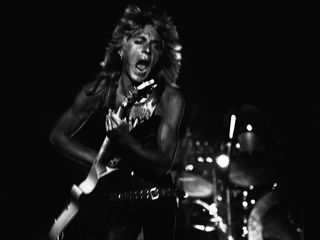
Exclusive book excerpt: Randy Rhoads by Steven Rosen and Andrew Klein
December 27th, 1981 was the first day of rehearsals, and it didn’t go well. Randy was very ill and could do little more than huddle inside a blanket, shivering and smoking cigarettes. The power was out and the PA didn’t work. None of the moving pieces functioned properly, and the entire time Sharon Arden stalked about the stage like the proverbial queen of the castle.
Randy regained some of his strength and toward day’s end, he, Rudy and Tommy jammed a bit. Airey was doubled-over with awe and thought they sounded like Cream. By the next day, the kinks had been worked out and the band started running through the set. Any trepidation Don Airey originally felt was gone the minute the band broke into the first song. Hearing Randy play truly inspired him, and that wasn’t an easy thing to do because he’d just come off the road playing with Ritchie Blackmore.
Entertainment Tonight came by to film three songs from one of the rehearsals, though Ozzy had tried to veto the idea. He felt it was too early in the process and cameras shouldn’t be allowed in. Still, they were present and provided another rare piece of professionally-shot footage.
The Cow Palace in San Francisco, California provided the venue for the first stop on the Diary Of A Madman tour. Everything that could go wrong on that December 30, 1981 gig, did. A kabuki curtain, timed to drop during “Over The Mountain,” went untriggered. The AC power malfunctioned, and without power, the relays would not release it. The drum set was placed under a pyramid stairway, and when Ozzy rose from his throne at the outset of the show, the drums were supposed to be hydraulically elevated. They started rising, but Ozzy’s chair was still attached.
Adding final insult to injury, some genius in the production crew had the brilliant idea of throwing liver into the crowd from a giant sling-propelled hand. The theory was that liver would magically transform into liquid blood if hurled at a high enough velocity. During the Cow Palace show, the liver was still frozen and some fan was bombarded with five pounds of rock hard meat. After that night, the giant hand was never again used to toss raw flesh, but became a platform for Ozzy to sit on.
Nothing worked at the Cow Palace but it wasn’t a total loss. Randy Rhoads was awarded the Best New Talent Award from Guitar Player magazine that night. At the time, Guitar Player was the Holy Grail of all things guitar. Upon learning that he’d won the award, he was ecstatic, nervous, and speechless all at the same moment. The band had been selling records and concert tickets and that was important. Winning the Best New Guitarist Award was, well, everything. Recognition from a magazine like Guitar Player was about the highest honor any musician could receive. The magazine had sent photographers to shoot the ceremony that found Randy typically low-key and humble.
“Since I’ve started this tour, great things haven’t stopped happening,” Rhoads admitted. “It gets to the point where you don’t know how to handle any good news anymore. You dream of things, of being in a band and getting the chance to do it. Getting the award was really great; it was the best thing that’s ever happened to me. When they told me, I thought they were joking because Sharon always jokes with me anyway. She called me one day and told me and I just didn’t believe it. I’m real proud and honored, and I don’t want to stop here, you know?”
Why would he? The train was rolling at a bullet’s speed and there wasn’t an obstacle in sight. There was one, though, in looking back, but it still seemed impossible. A day after the Cow Palace debacle, Randy, Don and Jodi were in a car, heading for the airport. Airey was reading a newspaper that contained a negative review that singled out Randy by calling him an “overrated guitar player.” Only the night before he’d won this prestigious award, and yet when he heard those words, his head dropped to his chest in absolute melancholy. From that point forward, a pall fell over the car.
As if on cue, the sun scurried behind a cloud, the sky darkened, and for one electric moment the world balanced on a pin. For some reason, Don turned quickly around in his seat and watched as a huge airplane tire dropped from the sky. Looking like some monster donut, it bounced dangerously along the freeway, and only missed the car by inches. It did smash into the car behind them and then disappeared. Everybody was frightened into silence and could only stare straight ahead, seeing nothing. Cars kept zipping by, and the world kept turning, but everyone in the car felt it, if just for a second...an icy shiver running up and down the spine.
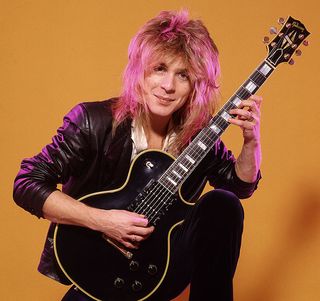
Exclusive book excerpt: Randy Rhoads by Steven Rosen and Andrew Klein
Randy’s credo was simple: “I don’t want to be satisfied with myself. Once you are, where are you going to go?” That was an essential question and one he still couldn’t answer. Every show became an all-out marathon, running at top speed from the curtain’s rise through the encore. His performances were almost flawless, and he constantly pushed himself to execute an arpeggio just a little cleaner and articulate a riff during his solo segment with a bit more finesse. Operating at such a high level was taking its toll.
Every concert had an ebb and flow, a rhythm all its own, but Randy was jacking up the stakes every night to eliminate any lesser moments. He must have been compensating for something, trying to fill an emptiness and feeding some craving that wouldn’t be satisfied. He probably didn’t know exactly what that feeling was, or where it was coming from. A lot of people in Randy’s shoes would have turned to drugs or alcohol, but he wasn’t wired that way. He found solace in the simple things like the respite that his classical guitar provided. But he was still lost as this beast inside him was growing hungrier and growling louder, and it had to be confronted.
“It seemed like the farther Randy got away from home, the tougher it was for him,” Rudy Sarzo remembered. Being in unfamiliar territory was not what he wanted. He also didn’t want to go onstage every night and play the same set; he was more into being creative. Basically, he had to paint the same masterpiece every single night. The worst thing you can do is be as great today as you were yesterday. You’re always looking for that magic moment to come out of somewhere, and there’s only so many of those that you can have in a single night.”
Maybe that’s what it was—looking for the magic within the drone of the everyday. Randy had mastered the music and wanted more. He needed more. One evening, in thinking the answer resided at the bottom of a bottle, Randy got completely wasted. He never drank to excess and hated himself when he did. The next morning, feeling like his head was in an anvil, he wanted Rudy to document the moment. “Do me a favor?” he asked. “Take a picture so I can remind myself of how I look when I’m hung over.”
Jodi also recognized his unhappiness. Randy still wrote to her religiously and talked about doing something different. Somewhere along the way he had lost himself. When he tried to put himself back together, he came out as someone else, and he didn’t like that person. The audiences still cheered, and he continued to play brilliantly, but something was missing. The dream wasn’t what it seemed.
“Somewhere along the way he just stopped being himself,” Jodi explained. “He was not happy at all. He needed a break and he really wanted to be at home and play classical guitar exclusively. He mentioned going back to school and doing other things. He was starting to feel very unhappy playing with Ozzy and the band, and he became extremely uncomfortable. I know for a fact that he wanted to do something different with his life.”
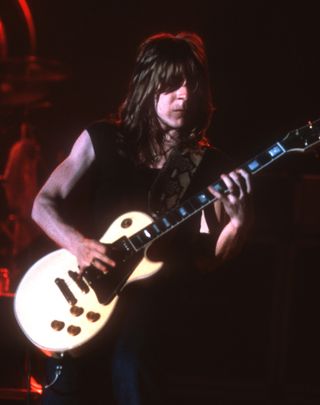
Exclusive book excerpt: Randy Rhoads by Steven Rosen and Andrew Klein
Because Randy always kept in contact with his friends, they knew about his deteriorating situation with Ozzy. On his last visit home, he talked with Jan McGuire who immediately saw his distress and felt the hurt inside him.
Jan learned that Randy wanted to leave the band and study classical guitar full time. Ever the student, he didn’t think he could truly call himself a guitar player until he’d mastered that style. He was afraid and confused and reluctant to open up. But he was obviously fearful for the future, and for the first time in her life Jan saw her ex-boyfriend under intense duress.
Whether Randy actually broke down in front of his bandmates was unlikely. But they all saw how ill at ease he was, and the desperation growing inside him. Don Airey recognized the syndrome immediately, that of the unknown, the underdog suddenly thrust into the limelight. The person he once was, was disappearing in direct proportion to the world’s perception of him. That is, the harder he tried to hold onto Randall William Rhoads, human being, the faster he morphed into Randy Rhoads, rock star. He despised that role, the man in the spotlight, and he wanted it turned off. Quite frankly, he wanted it to end. It had been just over 3 months since he was quoted as saying “Five years from now, I would love to have people know me as a guitar hero.” But in those 3 months, his reality had been radically altered.
His devotion to family and friends had never waned, and he now longed for them more than ever. Life as a traveling musician had grown wearisome and soul crunching. Watching Ozzy and Sharon constantly at battle left him shell-shocked, and he had had enough. Two-and-a-half years away from the people he loved had finally taken its toll. In letters and postcards, he wrote of his misery and growing depression with his circumstances. He wanted to come home, and it was time to get out.
“Everything happens so fast in this band,” Randy realized. “I haven’t had enough time to think what I want to do. I practice less than I did because I don’t have the time. I can’t sit down in a hotel room and practice. I still have my past in me. I am trying to accept all this, but I don’t have my feet on the ground at all. I don’t know who I am or what I am. What it does is make you totally frightened and humble. You don’t understand it. Everything comes at you so fast. Obviously, now it’s just go, go, go. There are no breaks or anything. When I do get a long break, I want to go back to teaching and take lessons again. If I get a month off, I am going to take lessons. I want to keep bettering myself.”
Contents from Randy Rhoads courtesy Andrew Klein and Velocity Publishing. Visit the book's site at Velocity Publishing Group.
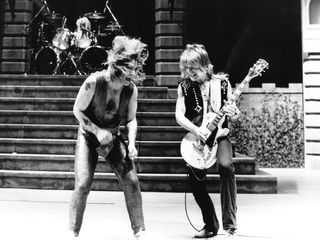
Exclusive book excerpt: Randy Rhoads by Steven Rosen and Andrew Klein
The following is an interview with Randy Rhoads co-author Steven Rosen.
What appealed to you about doing a book on Randy Rhoads?
“To be honest, I wasn’t a huge Randy fan, and I told that to Andrew when he asked me to get involved. I thought what Randy did with Quiet Riot OK. Actually, I saw him a couple of times at the Starwood, and I thought he was all right. There were certainly better guitar players, like George Lynch or Eddie Val Halen.
“Andrew’s passion drew me in. Andrew, Peter [Margolis] and I conducted interviews together and separately and it is from those interviews that we compiled the story. During this process, I went back and listened to the Ozzy records and the Quiet Riot stuff, and then it hit me how special he was. That’s what got me into the project. And then I saw how much Randy touched all of the people he played with. Everybody who knew him, from the first time he played backyard parties when he was 15 years old, had a sense that he was destined for great things.”
Was there anything that surprised you about what Randy’s friends and family had to say about him?
“I don’t know if it surprised me, but what struck me was how much everybody loved Randy as a person over and above his guitar playing. Had Randy not played guitar, they still would’ve been attracted to him. He had this charisma and charm that was undeniable. Everybody said that. It’s kind of funny, because even though people thought he was going to go on to big things, they always thought that Randy belonged to them. He was their little Burbank guy, the local kid. It’s like they didn’t want him out there in the world. Not that they sensed that something bad would happen to him, but they were just very protective of him as a person, a musician and a special friend.”
For the uninitiated, for those who might have heard about Randy but don’t know his work, what would you say he really brought to rock guitar that was unique?
“That’s a difficult one. As someone who has met and talked to hundreds of players, everyone from Jeff Beck and Eddie Van Halen and Jimmy Page, I would say that Randy was one of the few people who brought his own style of guitar playing to the masses. Two or three other really did that – I realized this once I started digging in. When I first heard Edward play, I thought, ‘This is something special. He’s going to be right up there.’ Eric Johnson is another guy like that.
“With Randy, it was his modal sense and the way he utilized classical music. He also had a brilliant command of rhythm – it’s like he bounced off the strings. Eddie had that same touch. The tone of Randy’s guitar was different. He didn’t go for an extremely overdriven sound, and even though he used a Les Paul through a Marshall on a lot of tracks, he still got a sound that was his own. The classic element loomed large in his work, but he also had a blues side. He loved Leslie West, Mick Ronson and the early Alice Cooper stuff.”
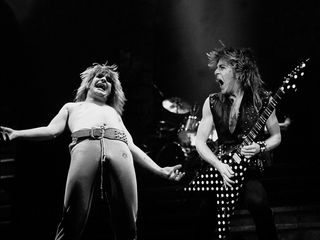
Exclusive book excerpt: Randy Rhoads by Steven Rosen and Andrew Klein
It’s funny you mention the blues and Randy. A lot of people don’t think of him as having a blues side to him.
“He loved the blues. He had a reckless, rock 'n' roll/blues side to him that was as big as the classical side, the part of him that was a real perfectionist. He was very much in control, but he could let go, too.”
He talked about leaving Ozzy to pursue the classical guitar. It’s conjecture, of course, but do you think he would have really quit? Lots of guitarists put out side projects and solo albums but continue in big bands.
“I really think on some level – and I’m speculating, of course; who really knows what would have happened? – that Randy thought his art was being polluted the longer he remained in Ozzy’s band. He looked at the classical guitar as the purest form of guitar playing. I don’t think he believed that he could do both well, and that’s why he was willing to walk away from Ozzy’s band. Which is remarkable when you think about it – if he would’ve stayed with Ozzy, he would’ve gotten bigger and bigger. His scope and influence would’ve rivaled Van Halen’s – and it has, in some ways.
“But I think he would’ve walked away because a) he was tired of the rock thing – he’d done it already, and b) because he thought it was minimizing what he could do as a classical guitar player. He didn’t want to compromise.”

Joe is a freelance journalist who has, over the past few decades, interviewed hundreds of guitarists for Guitar World, Guitar Player, MusicRadar and Classic Rock. He is also a former editor of Guitar World, contributing writer for Guitar Aficionado and VP of A&R for Island Records. He’s an enthusiastic guitarist, but he’s nowhere near the likes of the people he interviews. Surprisingly, his skills are more suited to the drums. If you need a drummer for your Beatles tribute band, look him up.
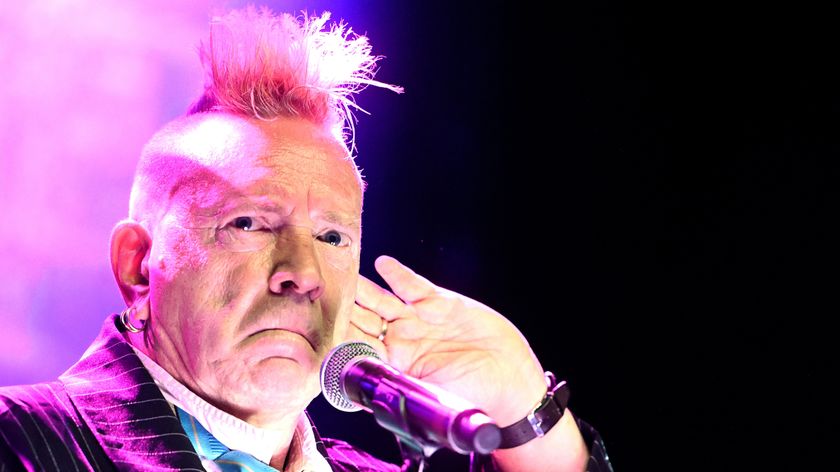
“Let them wallow in Walt Disney woke expectations”: John Lydon’s message to the reformed Sex Pistols
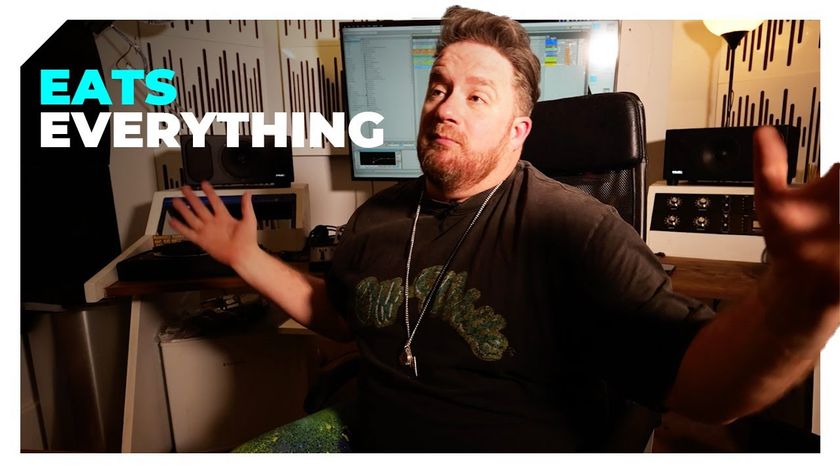
“Entrance Song is a massive 808 sub and a 909 kick. Those two shouldn’t work together - I’m not sure they were even in key”: Eats Everything on his ever-changing approach to production and DJing

“Let them wallow in Walt Disney woke expectations”: John Lydon’s message to the reformed Sex Pistols

“Entrance Song is a massive 808 sub and a 909 kick. Those two shouldn’t work together - I’m not sure they were even in key”: Eats Everything on his ever-changing approach to production and DJing
